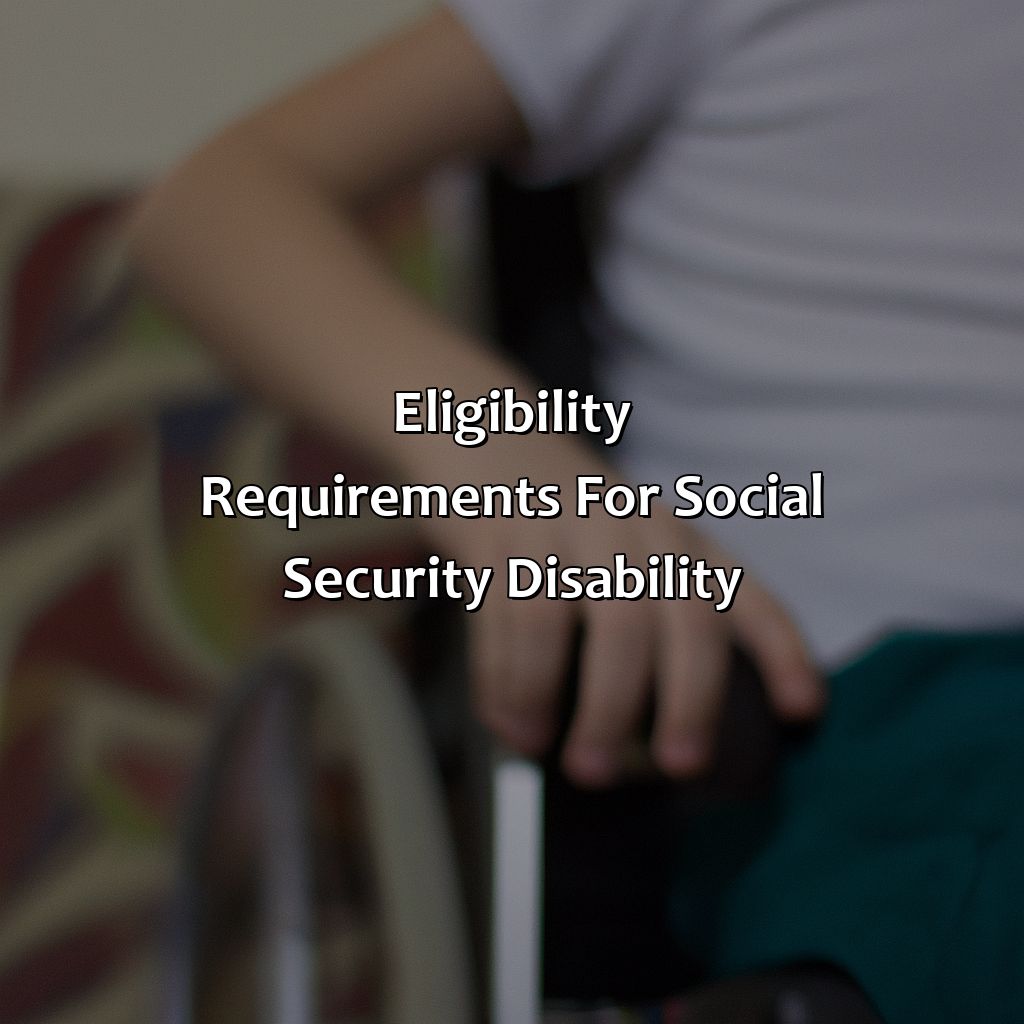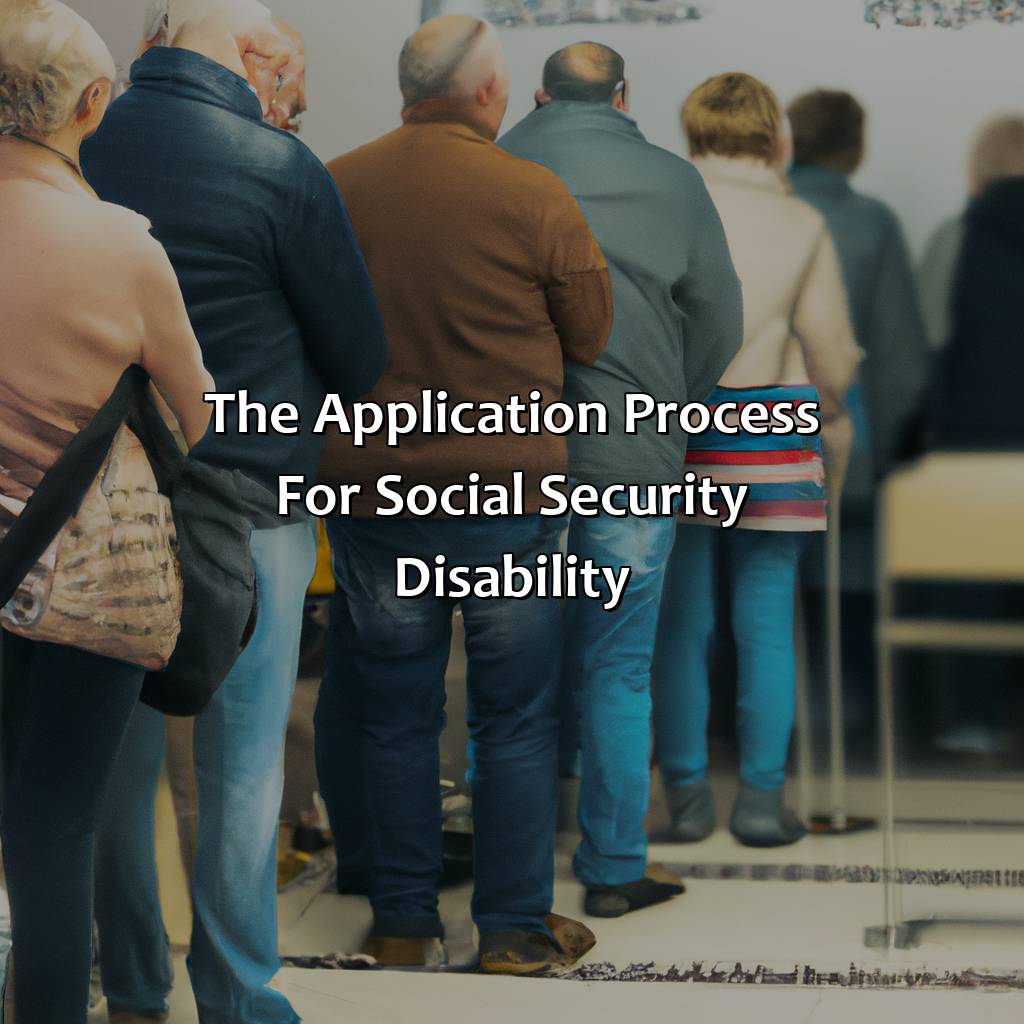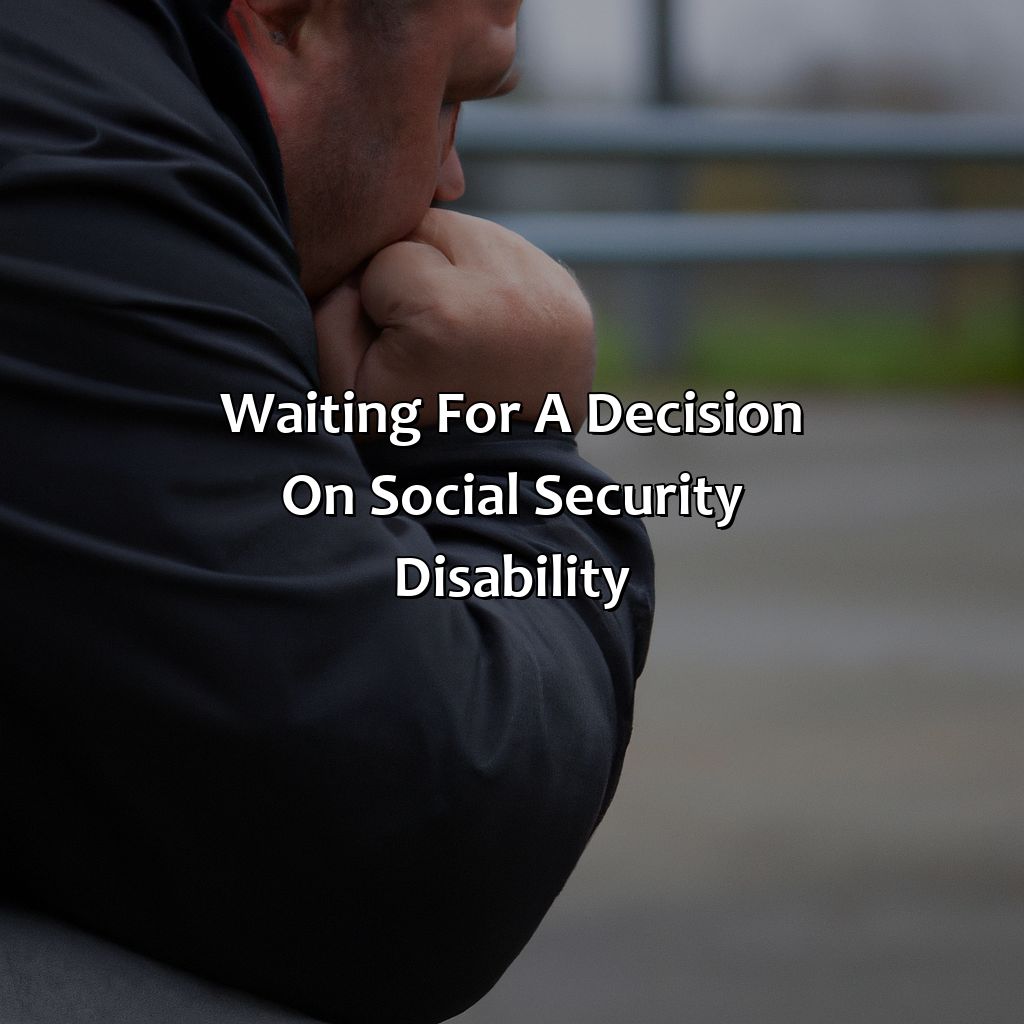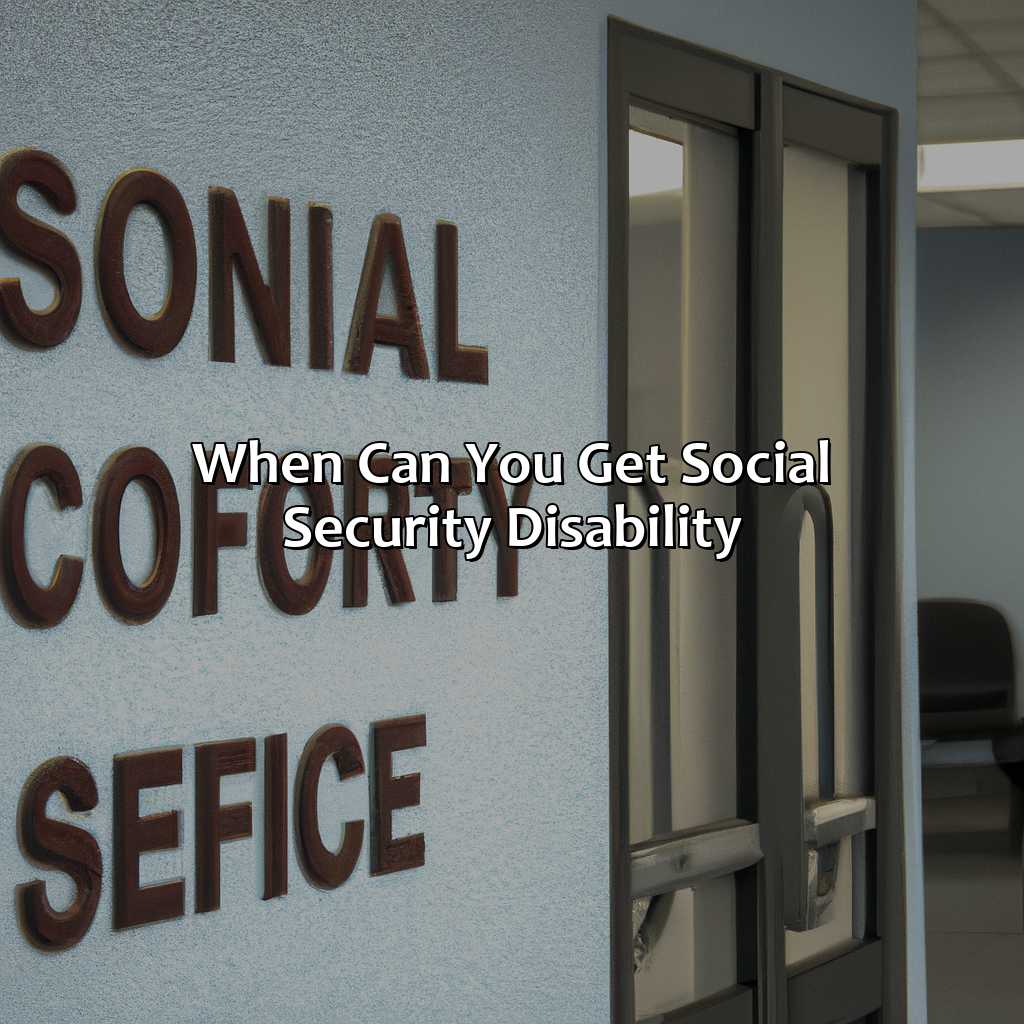When Can You Get Social Security Disability?
Key Takeaway:
- To be eligible for social security disability benefits, you must meet the definition of disability and have sufficient work credits.
- When applying for social security disability, it is important to gather all necessary documentation and choose to apply online, in person, or by phone.
- The decision process for social security disability can be lengthy, but if your claim is denied, you have the option to appeal. Once approved, the amount of monthly benefits received and eligibility for other benefits will vary.
Are you unable to work due to a disability? You may be eligible to receive Social Security Disability benefits. Learn more about when and how to apply with this helpful guide.
Eligibility requirements for social security disability
Are you eligible for Social Security Disability? To find out, you must fulfill the criteria set by the Social Security Administration. You must show that you satisfy their definition of disability. Plus, you must also have enough work credits. Let us explain the two parts of the eligibility requirements for Social Security Disability:
- You must show that you satisfy their definition of disability.
- You must also have enough work credits.

Image credits: retiregenz.com by David Duncun
Meeting the definition of disability
To qualify for Social Security Disability benefits, one must meet the definition of disability and fit certain criteria. This involves having a medical condition that has lasted, or is expected to last, for at least 12 months. The condition must be severe enough to prevent him/her from doing substantial gainful work.
Meeting the definition of disability requires a complex and often lengthy process involving multiple assessments of one’s medical history, work history, and current functioning. It is important to note that not all medical conditions automatically qualify for Social Security Disability benefits. The SSA has a strict set of guidelines that determine eligibility based on specific physical or mental impairments.
It is crucial to have proper documentation as well as support from licensed professionals when applying for Social Security Disability benefits. Consistent treatment and communication with doctors can also help in building a strong case.
When seeking social security disability eligibility there are certain factors you need help with such as getting required documents in order, preparing for tedious administrative processes and effectively presenting your claim in court. Without sufficient preparation it’s possible that your application may get rejected even if you meet all the requirements.
For instance, a man with chronic pain struggled to hold down any jobs due to his illness which made it really difficult for him and put tremendous pressure on his family so he reached out for help and applied for social security disability program after several rejection appeals he finally received his benefits. This greatly improved his quality of life and lessened stress on family income.
Looks like my only chance at getting social security disability is by counting all the hours I’ve spent binge-watching Netflix as work credits.
Having sufficient work credits
To be considered eligible for social security disability benefits, you must have earned sufficient work credits. These credits reflect your work history and are determined by the Social Security Administration based on the number of years you have worked and your income during that time.
Without sufficient work credits, you may not qualify for social security disability benefits even if you meet other eligibility requirements. The number of credits required can vary based on age at the time of application, but generally, you need to have worked and paid into the system for at least ten years to be eligible.
It’s important to keep track of your work history and ensure that your earnings and employment records are up-to-date with the Social Security Administration. Failing to do so could result in missing out on potential benefits in the future.
Don’t risk losing out on social security disability benefits due to inadequate work credits. Ensure that your employment record is accurate and up-to-date with the Social Security Administration today.
Getting through the social security disability application process is like a game of Minesweeper – you never know where the next obstacle is hiding.
The application process for social security disability
To get social security disability, follow the right steps in the application process.
- Gather the needed documentation.
- Then, apply online, in person, or by phone.
These sub-sections will help guide you. They will provide the info and resources to apply with confidence.

Image credits: retiregenz.com by James Washington
Gathering necessary documentation
To get approved for Social Security Disability, it is essential to gather necessary documents before applying. These documents play a vital role in determining the eligibility of the applicant and may affect the approval process significantly.
Here’s a six-step guide to help you with ‘Compiling Essential Documents’:
- Obtain your Social Security number.
- Gather medical records – Include documentation of diagnoses, treatment plans, medications received, hospital stays and surgeries.
- Collect work history – Keep track of the last five jobs held along with paystubs of different periods.
- W-2 forms or Tax Returns – Have these ready to display your income before becoming disabled.
- Adult Disability Report – This report covers all relevant information and an overview of medical conditions incurred by an individual who wishes to receive benefits from SSA
- Other legal or financial documents – Gather any legal paperwork such as divorce decrees or child support requirements that affect your case.
It’s important to note that some required documents may vary depending on your unique situation. Ensure to consult with professionals if faced with any ambiguity.
Coming to lesser-known details about compiling documentation, we suggest having multiple copies of primary essential paperwork. Keeping digital copies on hard drives can be helpful when needing access beyond regular business hours.
In summary, Sarah had throughout her life worried regarding how she’d take care of herself if she gained a debilitating condition like Alzheimer’s but researching cleverly utilised tools such as Social Security Disabilities insurance long prior before being diagnosed ensuring future financial needs were met. Whether you use your laptop, visit a local office, or call them up, the process of applying for social security disability is still as fun as a root canal.
Applying online, in person, or by phone
One can apply for social security disability through various means such as via the internet, attending in-person appointments or by phone calls to the Social Security Administration (SSA).
- Applying online is convenient and easy, just log on to the SSA website and follow the steps.
- If you prefer face-to-face interactions, then going in person to a local SSA office would be the best option.
- Those who have trouble with internet access or prefer speaking directly with a representative can apply by phone.
- Regardless of how one applies, it’s crucial to provide complete and accurate information in order to receive fair consideration for SSD benefits.
It’s worth noting that applying online offers further benefits like saving time, convenience and tracking application status updates.
With more than 60% of first-time applications being denied nationwide, applicants need quality legal representation to avoid burdensome appeals processes.
According to Forbes’ recent report [source], individuals waiting on their social security disability claim approval will wait approximately two years from filing until their case is successfully reviewed.
Waiting for a decision on social security disability – the perfect time to learn a new hobby, like watching paint dry.
Waiting for a decision on social security disability
Waiting for a decision on Social Security Disability? Check out this section! It offers potential solutions. How long does the process take? We’ll provide insight. Also, if your claim is rejected, we can help with the appeal.

Image credits: retiregenz.com by David Duncun
Length of time for decision
The duration of the waiting time for a Social Security Disability decision typically varies. It can take anywhere between 30 to 90 days or more depending on the number of requests made and natures of medical examinations needed.
The Social Security Administration assesses several factors during the evaluation process that includes the nature of individual’s disability, medical records, employment history, and whether or not an in-person consultation with an SSA representative is required. All these require substantial time to analyze accurately.
It is vital to note that in many cases, appeals may take a significantly longer period than initial applications to obtain social security disability benefits. Further medical exams and reviews may need to get conducted, which usually add more days to the process timeline.
It is essential to file a correct application as soon as possible because it generally takes more time than envisaged to complete all evaluations, and there are several steps within each stage. Delaying filing could lead to prolonged income loss while waiting for social security payments.
So consult an attorney right away when planning on applying or your current application/appeal due date draws near!
Don’t give up hope just yet, appealing a denied claim for social security disability is like playing a game of Monopoly – it may take a while, but with the right strategy and a bit of luck, you could still come out on top.
Appealing a denied claim
If your claim has been denied, you can appeal the decision. This process involves providing more evidence to support your case and may require a hearing before an administrative law judge. Appeals are time-sensitive, so it’s essential to act quickly.
During the appeals process, you may want to consider seeking legal representation. Social security disability lawyers have experience with the appeals process and can help ensure that your claim receives proper attention.
Remember to keep in touch with Social Security Administration (SSA), and do not miss any deadlines. Staying organized throughout this process is key. Keep track of all correspondence, documents, and dates related to your case.
Appealing a denied claim can be challenging, but it’s essential to remain persistent. By staying on top of deadlines, gathering new evidence, and potentially seeking legal representation, you increase the chances of receiving social security disability benefits.
Finally getting approved for social security disability is like winning the lottery, except instead of cash, you get a lifetime subscription to waiting on hold with government agencies.
Receiving benefits from social security disability
Navigate the system to receive social security disability benefits. To know the amount of monthly benefits and eligibility for other benefits, check this section. It’s titled “Receiving Benefits from Social Security Disability“. Get the info you need!

Image credits: retiregenz.com by Yuval Duncun
Amount of monthly benefits
Social Security Disability benefits provide monthly payments to individuals who are unable to work due to a disability. The amount of monthly benefits is determined by the individual’s earnings history and the severity of their disability.
The Social Security Administration uses a complex formula to calculate monthly benefits, considering factors such as the number of years worked and the average earnings per year. Additionally, the severity of the disability may affect the amount of benefits received.
It’s important to note that there is a maximum amount an individual can receive in Social Security Disability benefits each month. This amount changes each year based on cost-of-living adjustments.
In one instance, John was unable to work after suffering a back injury. He applied for Social Security Disability benefits and was approved, receiving monthly payments based on his earnings history and severity of his disability. The financial assistance allowed him to focus on his recovery without worrying about finances.
Why have just one disability when you can potentially qualify for a whole range of benefits?
Eligibility for other benefits
Individuals who are eligible for social security disability benefits may also be eligible for other benefits. These benefits could include Medicare coverage, Medicaid, and Supplemental Security Income (SSI) payments. Eligibility for these additional benefits is based on factors such as income level, disability severity and duration, and age.
To receive Medicare coverage, individuals must have received SSDI benefits for at least two years or have end-stage renal disease or amyotrophic lateral sclerosis (ALS). SSI payments are available to those with low income and limited resources who meet the criteria for SSDI or have a disabling condition that prevents them from engaging in substantial gainful activity. Medicaid eligibility varies by state but is generally available to those with SSI eligibility or who meet specific income requirements.
It’s important to note that receiving other types of disability benefits may impact eligibility for social security disability benefits. Individuals should speak with a professional to understand how their receipt of other benefits may affect their SSDI eligibility.
Pro Tip: Understanding the eligibility requirements and the impact of receiving additional benefits can help individuals maximize their support during times of financial hardship due to disabilities.
Some Facts About When Can You Get Social Security Disability:
To qualify for Social Security Disability benefits, you must have a medical condition that meets the Social Security Administration’s definition of disability. (Source: SSA)
The Social Security Administration provides benefits to individuals who are unable to work due to their disability. (Source: SSA)
There is no age limit for receiving Social Security Disability benefits. (Source: SSA)
The length of time it takes to receive Social Security Disability benefits varies on a case-by-case basis. (Source: SSA)
You can apply for Social Security Disability benefits online, by phone, or in person at a Social Security office. (Source: SSA)
FAQs about When Can You Get Social Security Disability?
When can you get social security disability?
You can get social security disability benefits if you have a medical condition that prevents you from working for at least 12 months or is expected to result in death.
Is there an age requirement to receive social security disability?
No, there is no age requirement to receive social security disability as long as you have a qualifying medical condition and have worked and paid Social Security taxes for a certain number of years.
How do you apply for social security disability?
You can apply for social security disability by visiting your local Social Security office, calling the Social Security Administration, or applying online through their website.
How long does it take to receive social security disability benefits?
The time it takes to receive social security disability benefits varies depending on the individual case. Some people may receive benefits within a few months while others may take longer.
Can you work while receiving social security disability benefits?
Yes, it is possible to work while receiving social security disability benefits, but there are strict limitations on how much income you can earn. If you earn above a certain amount, your benefits can be reduced or even suspended.
What should you do if your social security disability application is denied?
If your social security disability application is denied, you should consider appealing the decision. You have 60 days from the date of the denial to appeal. It is recommended to seek assistance from an experienced social security disability attorney.
 Checkout this IRS Loophole
Checkout this IRS Loophole 
